

Keywords: Industrial 5G, Private Networks, Enterprise Networks, Digital Transformation, Next Generation Communications, Telecommunications, CSPs, ARC Advisory Group.
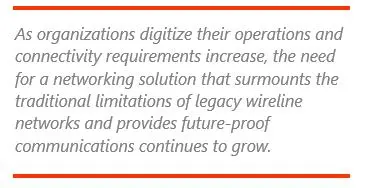
Private 5G solutions represent a complex ecosystem that necessitates a collaborative approach involving various technology stakeholders. Hardware suppliers play a crucial role in providing the necessary infrastructure components, such as base stations and antennas, tailored to the specific needs of the deployment. Cloud/server vendors offer scalable and flexible computing resources and hosting mission-critical applications. Telecom service providers bring expertise in network management, spectrum allocation, and connectivity services, ensuring reliable and secure operation of the 5G network.
At the heart of this collaboration is the systems integrator, orchestrating the integration of hardware, software, and services from different vendors into a cohesive and efficient solution. Their expertise in designing, implementing, and optimizing complex systems ensures seamless interoperability, performance, and future scalability of private 5G networks.
Escalating demands for seamless connectivity, heightened security, and reliable performance in enterprise and industrial networks are propelling interest in private 5G networking solutions. As organizations digitize their operations and connectivity requirements increase, the need for a networking solution that surmounts the traditional limitations of legacy wireline networks and provides future-proof communications continues to grow.
Private 5G networks can provide a future-proof infrastructure capable of accommodating emerging concepts like Industry 4.0, artificial intelligence, and autonomous operations. Establishing networks that can handle the increasing requirements of future technology ensures that enterprises can remain at the forefront of innovation and integrate new applications and devices as needed.
Building a comprehensive private 5G solution requires a complex ecosystem of technologies, and enterprises must recognize that no single supplier can provide every component needed for a seamless network installation. To successfully deploy a robust private 5G network, enterprises must adopt a philosophy of collaboration. Engaging with domain experts becomes paramount, as these professionals bring specialized knowledge and experience in different facets of network deployment and design, including hardware, software, and security considerations as well as knowledge of geography and industry-specific requirements. By leveraging the expertise of system integrators, enterprises can ensure a holistic and tailored approach to their private 5G solution that aligns with their unique business needs.
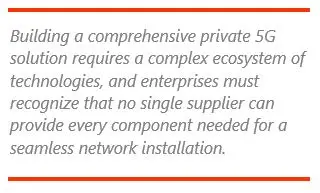
Major stakeholders critical for a successful private 5G installation include telecommunications providers, hardware suppliers, cloud and server partners, and integrators. Telecommunications providers bring expertise in network infrastructure, spectrum management, and connectivity, offering the essential backbone for a reliable private 5G network. The unique requirement of spectrum availability for private 5G networks underscores the importance of forging partnerships with regional telecommunications providers. As enterprises deploy 5G solutions within their facilities, availability of suitable spectrum becomes an important challenge to overcome. Engaging with regional telecommunications providers allows businesses to tap into their expertise and access spectrum resources. In places such as the USA, enterprises can directly procure spectrum from the CBRS band, but other localities have their own regional requirements to acquire private spectrum that may require intermediaries to navigate.
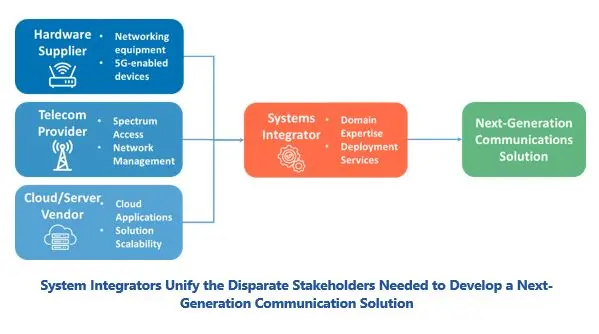
Hardware providers contribute critical components like edge devices, ensuring the deployment is equipped with the right technologies for the use case. Cloud/server partners play a pivotal role in enabling the scalability, flexibility, and management of the private 5G network, leveraging cloud-based solutions for efficient data processing and storage. System integrators coordinate and implement the combined solution, leveraging the synergy between ecosystem partners to create a resilient and converged private 5G strategy.
A significant knowledge gap currently exists between telecommunications experts and industrial enterprises regarding the requirements unique to mission-critical and industrial private 5G deployments. Telecommunications providers, often more accustomed to consumer-focused applications, may struggle to serve the often-stringent demands of industrial settings, leading to potential performance downfalls. Similarly, enterprises may lack the skillset necessary to manage telecommunication-technologies, including spectrum and infrastructure, complicating the collaboration between these two domains.
System integrators can play a crucial role in bridging this knowledge gap between operations and telecommunications experts. With a deep understanding of both enterprise and industrial processes and telecommunications technologies, integrators serve as intermediaries, translating the specific requirements of served enterprises to telecommunications professionals, and vice versa. By facilitating effective collaboration, bolstered by their own domain expertise, system integrators ensure optimized partnerships that can solve problems effectively.

Involvement in technology alliances, initiatives, and communities serves as a powerful catalyst for knowledge sharing and the development of effective private 5G solutions. By participating in collaborative ecosystems, enterprises gain access to a wealth of collective expertise, industry best practices, and emerging trends. These alliances facilitate open dialogue between key stakeholders, including vendors, integrators, and end users, fostering a dynamic environment for sharing insights and addressing common challenges in private 5G implementation.
This collaborative approach not only accelerates the learning curve but also cultivates a network of resources, enabling enterprises to tap into an abundance of knowledge and experiences, ultimately leading to more informed decision-making and successful private 5G deployments.
Implementing a private 5G network in a manufacturing facility, such as an automotive parts factory, can yield transformative benefits by enabling value-add technologies like autonomous vehicle operations, video analytics, and predictive maintenance. Deploying these technologies and ensuring they function seamlessly with the legacy systems on the factory floor place can be a demanding process that necessitates careful implementation with the assistance of an experienced consultant and integrator.
Beginning with network planning, the integrator can assess the plant's layout, production processes, and connectivity requirements to design an optimized network architecture. During installation and commissioning, they oversee the deployment of infrastructure components, including base stations, antennas, and networking equipment, ensuring seamless integration with existing IT systems, and minimizing disruptions to operations. Additionally, the systems integrator can conduct thorough testing of network coverage and throughput at various points within the facility, validating performance metrics and identifying areas for optimization.
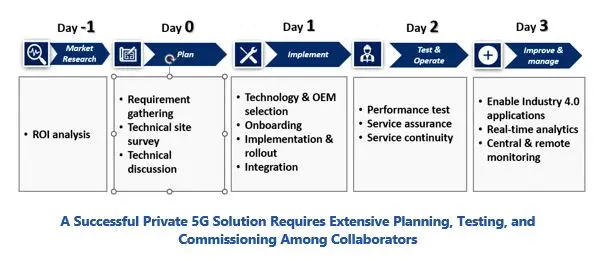
Once built, an integrator can perform a comprehensive security assessment of the network by analyzing the security requirements of the hardware, software, and network infrastructure. Thorough penetration testing can reveal potential weaknesses which guide the deployment of further security measures. Additionally, advanced threat detection systems can continuously monitor network traffic, anomalies, and potential security breaches in real-time.
Critical system integrator services such as network design and coverage analysis are paramount for deployments involving assets distributed over a wide area, such as a solar energy farm. Given the expansive and often remote nature of these facilities, meticulous planning and coordination with telecom providers is essential to ensure seamless connectivity and optimal performance across the entire site. The network design process involves strategically placing base stations, antennas, and networking equipment to maximize coverage while minimizing interference. By conducting thorough coverage analysis, integrators can identify potential dead zones or areas with weak signal strength, enabling them to implement targeted solutions such as additional infrastructure to ensure uninterrupted communication and data transfer throughout the solar energy site.
A robust private 5G network provides the high-speed connectivity and low latency required for deployment of real-time data management systems, as well as providing the backbone for remote control of drones, robotic arms, and rovers that operate in a solar energy facility. By assisting in the implementation of these sophisticated monitoring and control systems, integration partners can ensure solar farm personnel can remotely oversee operations and respond to issues promptly, minimizing the need for physical presence in hazardous areas.
LTTS provides a wide breadth of solutions and services, unifying the company’s engineering DNA with their multidisciplinary expertise in the enterprise, telecommunications, and industrial domains. LTTS utilizes its deep well of domain expertise to provide end-to-end private network solutions to a wide range of verticals that include automotive, energy, process industries, consumer products, healthcare and more. These solutions bring together the disparate parts of the technology ecosystem into a seamless, unified implementation with LTTS’ management and services. The company is intimately familiar with the needs of the value chain and leverages their extensive global partner network to serve the increasingly diverse needs of digitally transforming enterprises and other technology stakeholders.
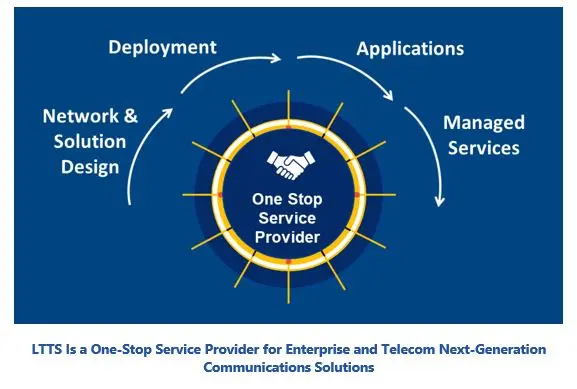
LTTS system integration services can bridge the knowledge gap between telecommunications and enterprise stakeholders, using their domain knowledge and global reach to provide a one-stop-shop experience for private network deployment, from site planning and network design to managed operations services and enterprise platform integration. LTTS understands the importance of maintaining an open dialogue with technology users, service providers, and other important ecosystem members, allowing collaboration and sharing of expertise for the toughest challenges.
Regardless of industry or geography, LTTS is a valuable partner for your private network journey. Cut through the hype and start a conversation with LTTS to start solving real problems and generating real value.
ARC Advisory Group clients can view the complete report at the ARC Client Portal.
Please Contact Us if you would like to speak with the author.
Obtain more ARC In-depth Research at Market Analysis

